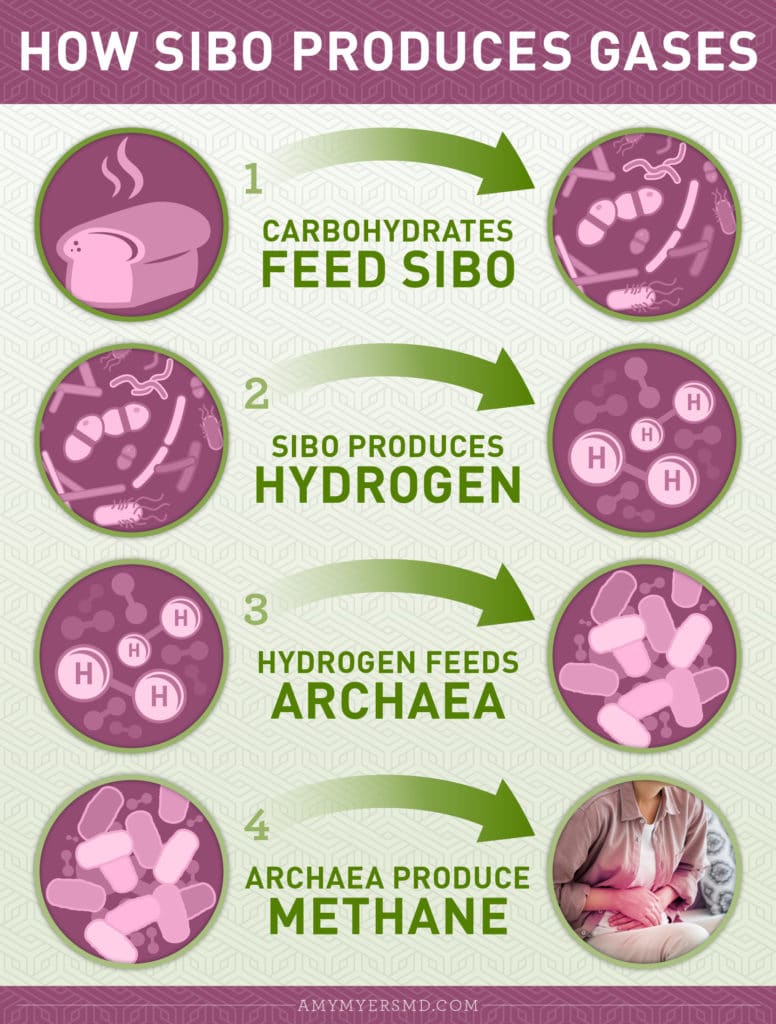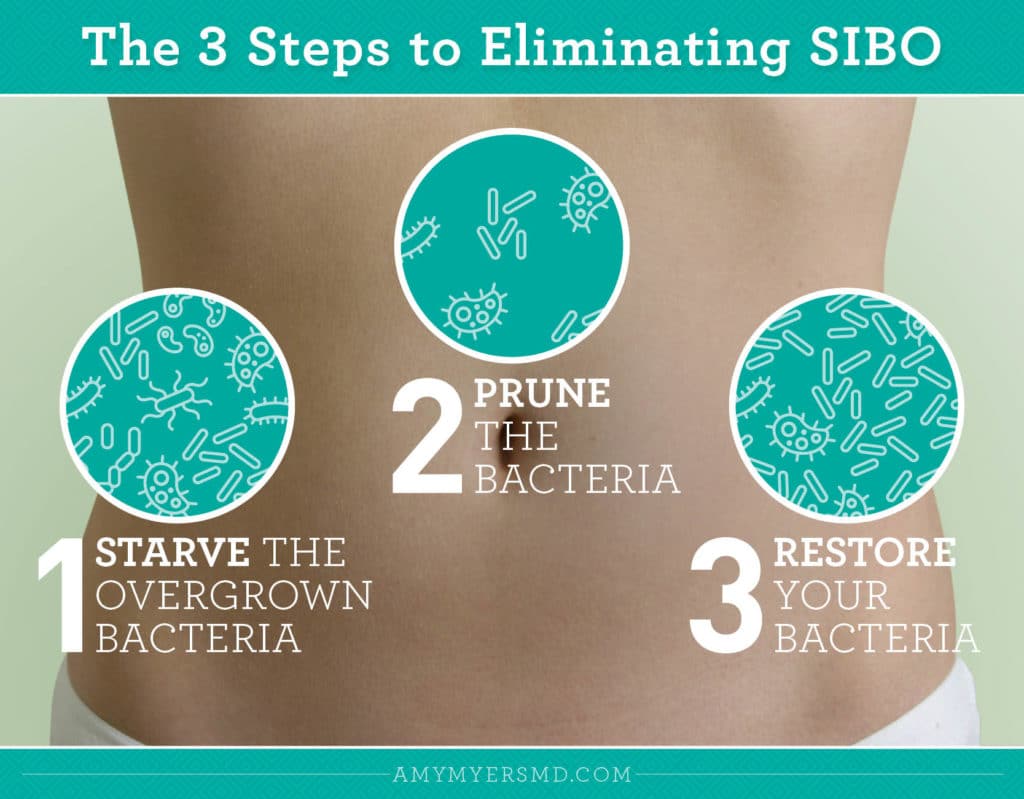Does your stomach swell up so much after eating a meal that you struggle to button your pants? Or maybe you wake up with a flat tummy, only to look 6 months pregnant by the end of the day! If you struggle with bloating and gas on a regular basis, you know how uncomfortable, embarrassing, and even painful bloating can be. It can interfere with your social life and self-esteem and could be bad news for your health in general if not properly addressed.
The truth is, any amount of bloating is a sign of inflammation in your gut. In my practice, I’ve found that the number one cause of bloating is a gut infection known as SIBO, or small intestinal bacterial overgrowth. This kind of bacterial overgrowth requires a particular probiotic to help you maintain a healthy balance of microflora in your gut.
I know that by overcoming SIBO, you can say goodbye to bloating and start feeling your best again!
What is SIBO?
So, what is SIBO? Your gut is home to trillions of microorganisms that play a role in your digestive function and immune health. Even your mood is affected! Most of the bacteria in your digestive tract are located in your colon and large intestine. A small amount lives in your small intestine.
When something causes an imbalance in your gut (known as dysbiosis), the bacteria in your colon and large intestine can overgrow into your small intestine. This can wreak all sorts of digestive havoc, and soon turn into a whole-body issue.
10 Signs You Have SIBO
1. Gas, bloating, and diarrhea
2. Abdominal pain or cramping
3. Constipation (much less common than diarrhea but still can be a symptom)
4. Diagnosis of irritable bowel syndrome (IBS) or inflammatory bowel disease (IBD)
5. Food intolerances such as gluten, casein, lactose, fructose, and particularly histamine intolerance
6. Chronic illnesses such as fibromyalgia, chronic fatigue syndrome, diabetes, neuromuscular disorders, and autoimmune diseases
7. Vitamin and mineral deficiencies, including vitamins A, B12, D, and E
8. Fat malabsorption (signified by pale, bulky, and malodorous stools)
9. Rosacea and other skin rashes
10. Leaky gut
Causes of SIBO
The main culprits behind developing SIBO include:
- Diets high in sugar, alcohol, and carbohydrates (which feed the bacteria)
- Hypothyroidism, which can slow your metabolism and cause a buildup of bacteria in your small intestine
- Low stomach acid, which leads to undigested food that feeds the bacteria
- Certain medications that disrupt your microbiome, including antibiotics, birth control, acid-blocking drugs, and steroids
- Stress, which messes with your digestion and causes dysbiosis
- Physical obstructions in the gut that can lead to an abnormal buildup of bacteria, such as diverticuli or scarring from surgeries or Crohn’s disease
- Dysmotility caused by diabetes, scleroderma, or neurological conditions such as Parkinson’s, ALS, or multiple sclerosis

How Does SIBO Cause Bloating?
The overgrown bacteria in your gut feed off of the undigested food in your small intestine—specifically carbohydrates. This feeding process ferments the carbohydrates and produces hydrogen gas as a byproduct.
In turn, that hydrogen can feed single-celled organisms in your small intestine known as archaea. These then produce methane gas as a byproduct. So when you have SIBO you have excess levels of hydrogen, methane, or both in your digestive system.
The effect of all this excess gas in your gut is exactly what you might imagine: severe bloating, belching, and flatulence. SIBO bloating can turn something as simple as going out to dinner with a friend into an uncomfortable, stressful event.
The good news is overcoming SIBO and restoring the microbial balance in your gut can eliminate bloating and other frustrating symptoms. You can once again enjoy worry-free meals with your friends and family.

How to Treat SIBO & Be Rid of Bloating for Good
Diagnosing SIBO can be done with the proper tests. However, I often determined the presence of SIBO by carefully evaluating the symptoms. Once you know that SIBO is causing your bloating and GI distress, I recommend following a 3-step approach. This will get the bacteria under control and restore your gut’s natural balance.
The three steps to eliminating SIBO are:
Step 1: Starve the Overgrown Bacteria
First, remove the foods that feed the bacteria in your small intestine — namely sugar, alcohol, and carbohydrates. In addition to the usual suspects, such as bread, cookies, cake, and cocktails, you’ll want to eliminate complex carbohydrates including whole grains and legumes. These foods get broken down into sugar in your gut, feeding the bacteria just as regular sugar would.
Instead, you’ll eat plenty of non-starchy vegetables, leafy greens, lean proteins, and healthy fats, with minimal fruit. Berries are a good low-carb, low-sugar option if you need to satisfy your sweet tooth.
Step 2: Prune the Bacteria
In my practice, I typically used the antibiotics Xifaxan and Neomyacin to attack the bad bacteria. Xifaxan is more effective against hydrogen-dominant SIBO, and Neomyacin tends to be more successful with methane-dominant SIBO. These antibiotics work exceptionally well to kill the pathogenic bacteria with the least amount of disruption to your good bacteria.
I’ve also helped thousands of people successfully treat SIBO at home. For self-treating, I recommend Microb-Clear®. It’s a blend of magnesium caprylate, berberine, and extracts from tribulus, sweet wormwood, barberry, bearberry, and black walnut.
These ingredients kill off the bacteria naturally. While they aren’t specific to pathogenic bacteria and can disrupt your good bacteria, they aren’t as harsh as broad-spectrum prescription antibiotics. Those can completely wipe out good bacteria and bad bacteria alike. Microb Clear® is a much more natural and gentle approach.
Step 3: Restore Your Good Bacteria
Finally, you’ll want to restore the good bacteria in your gut. This will help you support a strong immune system as well as optimal digestion and nutrient absorption. You have to be careful when treating SIBO though, as taking certain probiotics could just be throwing fuel on the fire.
That’s because the species of bacteria involved in SIBO are typically lactobacillus or bifidobacterium. The majority of probiotic supplements out there contain these same strains. These probiotics can be beneficial for those who don’t have SIBO. If you do have SIBO, they may feed the overgrowth and delay your progress.
For this reason, while dealing with SIBO I recommend using a soil-based probiotic such as Primal Earth®. It contains spore-forming bacterial strains that won’t colonize the small intestine.
Instead, these hardy probiotics have a seed-like structure that protects them from stomach acid, bile salts, and digestive enzymes. This enables them to survive the journey through your stomach. They’ll head straight to the colon and large intestine where they can support vibrant health.
I take Primal Earth® probiotics every day in addition to my regular probiotic supplement. That way I can make sure I maintain a healthy balance of bacteria in my gut.
Taking back your health—and fitting into your jeans—is only three simple steps away. As you begin to clear your body of SIBO, you’ll realize that the bloating you were experiencing is NOT normal. You will also start enjoying meals once again without the fear of gas, cramping, and abdominal distension.









Leave a Comment